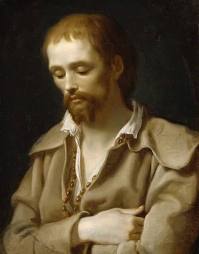Second pilgrimage to Amettes from Locre. During the journey I felt our Lord wanted to give me some message through St. Benedict Joseph Labre. No light came while praying in the Church or in the house; but when I went up to his little room and knelt down a voice seemed to whisper “Read what is written on the wall.” I saw these words: “God calls me to an austere life; I must prepare myself to follow the ways of God.” With these words came a sudden light to see how much one gains by every act of sacrifice, that what we give is not lost; but the enjoyment (increased a thousand fold) is only postponed. This filled me with extraordinary consolation which lasted all day.
COMMENT: April 16 is the feast day of St Benedict Joseph Labre. Fr Willie had a great devotion to Saint Benedict Joseph Labre – in one letter he outlines what he felt was a “strange devotion” that he felt to this saint, even as a boy. Indeed, the devotion we have to saints can often seem “strange” to us – we can end up attracted to saints without any specific reason that we can put our finger on. There are those who think that it is saints who choose to be friends with us rather than the other way around…
St Benedict Joseph Labre was a beggar; in the following quote from another of Fr Willie’s letters home from the war he shows us his affection for this saint, as well as his own personal humour:
I spent most of the next day wandering around the country, with a visit to the home and shrine of the beggarman saint, Benedict Joseph Labre. I often think he must be nearly mad with envy watching us in the trenches, surrounded, walked on and sat upon by his ‘pets’. But from the same pets deliver us, O Lord, as speedily as may be, this coming hot weather!
The pets to which Fr Willie refers are presumably fleas, lice and other creepy crawlies.
There are two lessons that we may take from today’s quote and feast.
Firstly, the obvious message relates to austerity. God called both St Benedict Joseph Labre and Fr Willie to a distinct type of austerity. We can be sure that we are also called to our own particular type of austerity, but this will vary from person to person and will correspond with our state in life. It is almost certainly the case that we are called to a different, and lesser, type of austerity – it would be wrong for someone to attempt to copy Fr Willie or St Benedict Joseph without guidance from a spiritual director. St Francis de Sales tells us that our cross is made specifically for us, so whatever austerity we are asked to bear, it will stretch us and help to perfect us, even if it is not as objectively severe as serving as a chaplain in the trenches or living homeless on the streets of Rome. However, we must remember that whatever austerity we live with, it should never make us sour or unpleasant. Those who knew Fr Willie always remarked on his cheerfulness and his good humour – his presence was a source of courage for the soldiers. So too with St Benedict Joseph Labre – despite his dirt and his poverty and austerity, his presence was a source of light to all those whom he encountered. Would that others would say the same of us!
The second lesson is that the call to holiness is universal. St Benedict Joseph Labre was a distinctly odd young man. He was certainly intelligent and very well read, but he chose (or felt called to) the life of a tramp. Some people even suggest that he was mentally disturbed, although perhaps that is going a bit too far. Nonetheless, the point remains that the young man who was not accepted into several monasteries and who wandered the roads of Europe visiting shrines and living homeless in Rome for a decade, far away from his family, was recognised by the Church as a saint worthy of honour and with virtues worthy of imitation. Truly there is wonderful diversity in the Church!
St Benedict Joseph Labre reminds us that everyone, including the poor, are called to be saints, and that those who are materially poor can be spiritually rich. It also reminds us that clericalism or spiritual elitism has no place in the Church. There are those who think that heroism is not for “ordinary” Christians. I’m not sure how that can be reconciled with the life, witness and canonisation of this holy tramp who allegedly had psychological problems.
After his death, the local children ran through the streets shouting that the saint was dead, and there were many miracles allegedly through his intercession after his death. An American Protestant clergyman called John Thayer was present in Rome when the saint died, and the experience of this holy beggar’s funeral converted him. He was ordained a priest and died in Limerick in 1815.
This is an excellent biography of St Benedict Joseph: http://www.ewtn.com/library/MARY/STBEN.htm
And this is an excellent homily on St Benedict Joseph Labre

